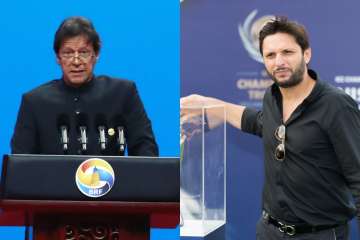Imran Khan must do more about Kashmir: Shahid Afridi
Afridi has come out with his autobiography in which tells his life story just the way he bats - instinctively, candidly and with no holds barred.

Former Pakistan skipper Shahid Afridi believes Imran Khan must do more about Kashmir and, India and Pakistan should resolve the issue through a Kashmiri-owned, Kashmiri-led peace process.
He also asserts that “Kashmir belongs to the Kashmiris. Not to Indians. Not to Pakistanis. That debate comes later. But first and foremost, Kashmir is for the Kashmiri people themselves.”
Afridi has come out with his autobiography in which tells his life story just the way he bats - instinctively, candidly and with no holds barred.
“Game Changer” is co-written with journalist Wajahat S Khan and published by HarperCollins India imprint Harper Sport.
Afridi says he is a big fan of “what Khan’s Naya Pakistan is doing with India”.
“From his peace overtures (I quote his first speech, about Pakistan taking two steps towards peace if the Indians take one step - an approach I personally believe in too) to opening the Kartarpur corridor and releasing the Indian Air Force pilot shot down by the Pakistanis in February 2019 - peaceful relations with India are essential. Both countries, even the subcontinental region, will flourish,” the all-rounder writes.
“However, Imran Khan must do more about Kashmir. We have to resolve that issue. We have to save the Kashmiri people, and we must involve them in the peace process.
Nobody in the Indian subcontinent has suffered or struggled more than Kashmiris,” he says.
“So much resources go into guarding this territory. So much goes into policing the Line of Control. So many mouths can get fed, so many minds can be nourished, if India and Pakistan resolve the Kashmir issue through a Kashmiri-owned, Kashmiri-led peace process,” he writes.
Afridi claims that Indo-Pak peace is a whole different argument and boils down to one man: Narendra Modi. He also claims that Khan is “relatively more flexible than Modi ji” and “he has already proven this”.
From his humble beginnings in the mountains of Pakistan’s unruly northwest to the mean streets of Karachi and the county parks of southern England, Afridi sets the record straight once and for all.
In his career, Afridi has been many things - the lost kid focused on pulling his parents out of poverty, the desperate captain trying not to snitch on his corrupt teammates, the gallant Pashtun centurion staring down a hostile Indian crowd, and the bad boy at the centre of a ball-tampering scandal.
In 1996, as a teenager, Afridi shot to fame after hammering the fastest ODI century at the time. One of the world’s greatest all-rounders, today, he holds the distinction of having hit the most number of sixes in the history of ODI cricket, scooping the most wickets in T20s and winning the most player-of-the match awards in the same format.
Once teammate Wasim Akram describes Afridi as brave as a warrior and one of the strongest men he has known.
Afridi says he couldn’t vote in 2018 and he regrets missing out; he tried to make his schedules work but couldn’t make it back to Pakistan in time.
“The 2018 elections in Pakistan were a landmark one. A cricketer is now the prime minister of the world’s sixth most populous country. Unfortunately, these elections came with some serious baggage.
“A narrative that continues to do the rounds is that the polls were not fair. I feel the jury is out on that one: it was a 50:50 thing,” he writes.
“Imran Khan is now the elected prime minister of Pakistan. We have to give him the respect that a prime minister deserves. We have to make things work. As for his vision, I don’t have any doubts about Imran’s integrity or the goals he has set to achieve - a vision that he calls ‘Naya Pakistan’, the new Pakistan. The real question which bothers me, though, is his team selection,” he says
He also says that he knows commenting about the prime minister is easier said than done.
“But there’s no doubt in my mind that Khan’s niyat, intention, is fine. His ability to execute - rather, his team’s ability - is what bothers me,” he writes in the book.